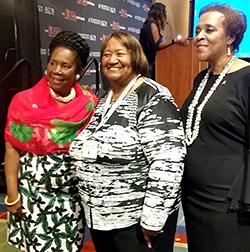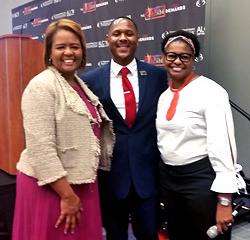AFT members and activists joined thousands gathered for the Congressional Black Caucus Foundation Annual Legislative Conference Sept. 12-16 where they heard from powerful leaders like Sen. Cory Booker (D-N.J.), Sen. Kamala Harris (D-Calif.) and Rep. Maxine Waters (D-Calif.); luminaries like the artist Common; political commentator Angela Rye; and activists like the Rev. William J. Barber and Tamika Mallory. At workshops, panel discussions and other events, participants applied an equity lens to pressing issues like education, health and wellness, civic engagement, economic opportunity and criminal justice. The AFT played a leading role with a professional development series for educators, attended by more than 120 AFT members and leaders.
Other discussions centered on the importance of education policy writ large and the urgency behind getting out the vote for the November 2018 elections. The Alliance for Reclaiming Our Schools released a report on the first day of the conference that detailed the systemic underfunding of public schools, focusing specifically on black, Latino and low-income students. “We must commit to electing people who will reverse this undermining of our students’ future and instead prioritize sustainable, equitable investment in our public schools,” said AFT President Randi Weingarten. “Public education is a critical rung on the ladder of racial and economic justice.”
“We have to vote,” said AFT Secretary-Treasurer Lorretta Johnson. “We have to have our families vote; we have to have our friends vote.” At an AFT members-only political luncheon, Weingarten urged attendees to recognize the significance of this moment in our nation’s history, and to use the power of the ballot box to elect leaders who support workers and the public good. “Our challenge is to continue to wake up our power base so that we can wield the outcomes that are possible,” said Schott Foundation CEO John Jackson. “When community and labor come together, we’ve been able to bring about systemic change.” One cohort of members took their activism further and spent an afternoon on Capitol Hill visiting their congressional representatives.
Professional development that works
During workshops, members dove into the details of their everyday work. In one, they considered how to could create community support for restorative practices that aim to reduce student suspensions by using discussion and emotional support rather than zero tolerance disciplinary policies. Leaders noted that by engaging the folks at the barbershop, the corner store, at places of worship and other entities in the community, students who do get suspended or even expelled from school have other resources to help steer them back toward finishing their education.
Another workshop offered tips from instructional coaches on how to engage students and provide effective learning environments. And there was a session on “survival” techniques for teachers, especially those who are new to the profession. Merlyna Valentine shared her experience “belly-flopping” during her first days as a teacher, and described how she overcame not only the frustrations in an under-resourced school but also severe challenges in her personal life. Due to complications from a kidney stone, Valentine lost her limbs and wears prosthetic hands and legs; her story of perseverance informed her advice for teachers to maintain focus and cultivate patience because, she says, “The kids who need love the most ask for it in the most unloving ways,” and “Every child is one caring adult away from being a success story.”
A luncheon panel probed mental health awareness and education, with experts sharing information about the signs of mental illness, best practices to help struggling students and ideas about how to dismantle the stigma of discussing mental health.
Fighting the onslaught
At an Education Brain Trust session, a panel of scholars and policy experts discussed how to combat the Trump administration’s assault on education. “It is no secret that this administration has set in place serious and brazen regulatory rollbacks that directly affect educators and their students,” said AFT Executive Vice President Mary Cathryn Ricker. “Like many rights in this country, public education is assuredly under attack.” After an introduction by Rep. Bobby Scott (D-Va.), who pointed out that despite the Civil Rights Act, Brown v. Board of Education and the Every Student Succeeds Act, “We still haven’t gotten to equity,” the panel discussed several setbacks. Among them: the repeal of measures designed to address the high suspension rate among black students, the disproportionate enrollment of black students in special education classes, the weakening of Title IX provisions against sexual assault and the urgency to “resist educational oppression,” as John Brittain, law school dean at the University of the District of Columbia, put it.
“Things are every bit as bad as any of us imagined they might be,” said Catherine Lhamon, chair of the U.S. Commission on Civil Rights, but “We must make a way out of no way.”
[Virginia Myers]


